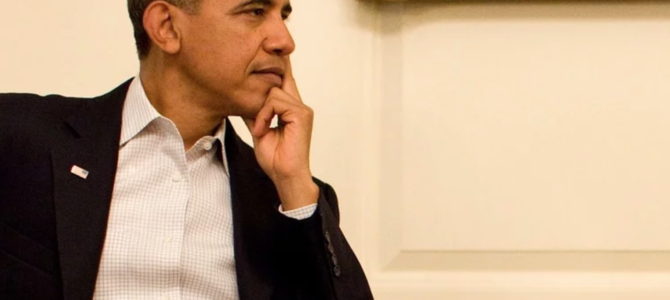
In a tweet ostensibly designed to elevate his own legacy, former President Barack Obama on Monday assumed credit for the current economic boom:
Eleven years ago today, near the bottom of the worst recession in generations, I signed the Recovery Act, paving the way for more than a decade of economic growth and the longest streak of job creation in American history.
This claim is difficult to square with the evidence. In fact, it falls short of the predictions of his own administration. Let us recall that the architects of the Recovery Act, Obama administration economists Jared Bernstein and Christina Romer, assured us the $800 billion spending bill would prevent unemployment from surpassing 8 percent.
In fact, they warned that without it, unemployment would exceed 9 percent. Yet despite their assurances, unemployment peaked above 10 percent, and the economy recovered at its slowest pace since World WarII.
Of course, Obama defenders will insist his administration simply underestimated the severity of the crisis, and that without the stimulus bill, things would have been worse, to which there are two responses. First, such a claim contradicts what happened in major economic disruptions throughout history: The worse the recession, the stronger the bounce-back.
Second, the suggestion that “things would have been worse” is irrefutable, as it stands insulated from empirical evidence. No matter how high unemployment may have climbed, one could claim that “things would have been worse,” and there would be no way to disprove it.
That is why understanding the dubious premise behind the Recovery Act is as decisive as observing the evidence against it. Nor is understanding its rationale merely an interesting bit of history. Rather, it continues to inform our public policy.
Why Government Spending Doesn’t Fix the Economy
The basic idea behind it is that fiscal tinkering, i.e. government spending, can help smooth the business cycle. According to the theory, people spend money during good times, keeping the economy strong, and save money during bad times, perpetuating a recession. Therefore, if the government spends when people save and cuts when people spend, it can attenuate — if not eliminate — the boom and bust cycle.
It’s an attractive theory, but it suffers from a fatal flaw. Government spending must be financed, which involves a dollar-for-dollar tradeoff with private spending, meaning Uncle Sam’s spending habits are powerless to increase the overall output of the economy in the short term.
Consider: Any dollar the government spends into the economy must first be removed from the economy. That is, the government must take a dollar from Johnny Citizen — either through borrowing or taxation — before spending it. Government therefore displaces private spending dollar-for-dollar, meaning the net effect of, say, a budget deficit or a “fiscal stimulus” bill like the Recovery Act is at best zero (It is in fact worse than zero, but more on that below).
That is because had the government not borrowed or taxed his dollar, Johnny would have spent it on a good or service. Of course, Johnny might have chosen to save his dollar by putting it in the bank. But even in that case, the bank would have lent it to someone else to spend, meaning all dollars — even savings in the bank — contribute to the economy.
Thus government borrowing or taxation must necessarily trade off with the private sector. As economist Brian Riedl put it, believing that government spending causes growth is like believing that taking a bucket of water from one end of the pool and dumping it into the other end causes the overall water level in the pool to rise.
This helps explain why, especially in the short term, the effect of government spending is often worse than zero. By taxing or borrowing money out of the economy, government sucks resources away from where they would be used most productively in the private sector, which impedes economic growth. This explains in large measure our tepid recovery following the 2008 crash.
Nor does this fundamental analysis of government spending change much in the long term. Although it is possible for government initiatives to yield a positive long-term impact on economic growth, that does not mean those efforts are the best use of resources.
For example, if the government spends money to build a bridge that shortens people’s commute times to work, it could increase the amount of time people spend working rather than commuting, which would improve productivity and therefore fuel economic growth. But that investment takes time; building a bridge does not happen immediately. Therefore, any positive impact would not be felt until after the bridge is completed, months or even years down the line.
Furthermore, the cost-benefit analysis of government projects cannot ignore what those funds would have been used for had they remained in the private economy. For instance, a private firm may have used those funds to construct the bridge, and perhaps at a lower cost, allowing the firm to build two bridges as opposed to the one government-constructed bridge.
Consequently, even when government projects improve the economy long-term, that is by no means proof that resources went toward their most productive use. The relevant question is how private actors would have used the funds had government neither borrowed nor taxed them out of the economy.
Politicians Fail to Question Government Spending
Unfortunately, this basic sketch of the economy is routinely ignored. Instead, the fallacy that government spending does, and should, steer economic growth goes unquestioned by major writers, politicians, and policymakers.
Two examples from opposing ends of the political spectrum will illustrate the point. In explaining the strength of the current economy, New York Times columnist Paul Krugman recently wrote: “[I]t is indeed a strong economy. But if we ask what lies behind that strength, the main answer is an explosion in the federal budget deficit, which exceeded $1 trillion last year.”
Similarly, Fed Chair Jerome Powell recently warned Congress to cut spending now so that it purportedly has ammunition at its disposal to combat a future recession, saying, “Putting the federal budget on a sustainable path when the economy is strong would help ensure that policymakers have the space to use fiscal policy to assist in stabilizing the economy during a downturn.”
Would that it were so, but it’s not. While Krugman and Powell may disagree on whether Obama deserves credit for our booming economy, both men appear to share the same misguided assumption as Obama: that government spending is and ought to be a tool to manage the economy.
In that regard, their assertions, like Obama’s tweet, are as confused as they are erroneous. And the lesson is clear: Federal spending cannot and will not stimulate the economy. That is one thing from the Recovery Act you can take to the bank.









